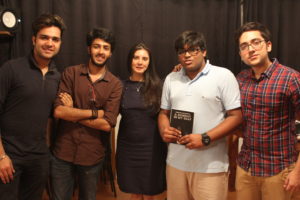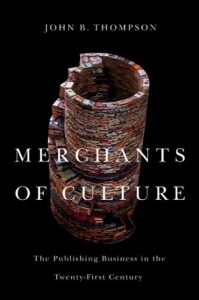In Times Of Representation
Over a decade ago I did a regular column for Business World. It was on the business of publishing. Here is the original url.
***
According to John Thompson in his book Merchants Of Culture: Literary agents first burst upon the scene in nineteenth century Britain. It began with A.P. Watt whose work as a literary agent appears to have begun around 1878, when he was asked by a friend, the poet and novelist George MacDonald, to sell his stories for him. By 1881, he was known as an advertising agent and a literary agent. Initially he charged a fee for the services he offered, but soon switched to taking a 10 per cent commission on the money that he earned for his clients on any transaction he completed. By the end of the nineteenth century, he was representing some of the leading writers of the time, including Arthur Conan Doyle, Walter Besant, Thomas Hardy and Rudyard Kipling. In 1893 when publisher William Heinemann wrote a scathing portrait of a literary agent, he in all likelihood had A.P. Watt in mind: ‘This is the age of the middleman,’ wrote Heinemann. ‘He is generally a parasite. He always flourishes. I have been forced to give him some little attention lately in my particular business. In it he calls himself the literary agent.
However uncomplimentary a statement this may have been of an agent, the truth is that a literary agent is an indispensable part of the publishing eco-system. Literary agents are defined as those who represent writers to publishers, theatre and film producers. They negotiate on behalf of the author for the best and fairest deal possible. For this, they are paid a commission, which is a percentage of the proceeds of the sale that they have negotiated for their client. It is usually 15 per cent for domestic rights and 20 per cent for international rights. An agent holds specialised knowledge of different publishing houses, is aware of the personal tastes of editors and is able to sell written material to them, matching the writer with the right stable. Agents also provide authors a range of services – reading a raw manuscript, assessing if it is fit for publication, if it is then helping them tidy it up before selling it to an appropriate publisher and in case it receives interest from more than one publishing house, setting up an ‘auction’ and selling it to the best bidder, negotiating terms and contracts and collecting payments and royalties. They also network with agents and publishers in other territories, across the world in order to ensure that the book gets published across the globe, and increasingly in different languages. A large part of this business happens specifically at the Frankfurt Book Fair. In his essay, Frankfurt (1981), Martin Amis says, Frankfurt is the arena of super-deals, mega-business, and transactions so high-powered that entire currencies are but pawns in the publishers’ vast dream….Seen as a tripe vertex of high commerce, high culture and high living — clearly, in mid-October, the Frankfurt Book Fair is the place to be.
The Quintessential Multitaskers
According to David Godwin, agents represent everything that a writer does, and “usually an advance is paid over four moments — signature, delivery, publication and paperback publication”. There are exceptions to the rule and some extremely successful authors are on a lower commission structure. For instance, Paulo Coelho is represented exclusively by Sant Jordi Asociados, a literary agency based in Barcelona that represents the best-selling author’s worldwide rights. Author and poet, Jeet Thayil says, a literary agent is a blessing, since s/he is responsible for all the nitty-gritty administrative work, including the tedious follow up required in signing a book deal, releasing precious time for the author to focus their energies on a constructive and creative output, rather than be exhausted by paperwork. His agent, David Godwin, says that an agent’s role ranges from “advising on a manuscript, editorial advice, planning a career, making deals, following up myriad enquiries, taking phone calls any time of the day, and being a professional ally at all times.”
So is an agent necessary? A question often asked by new as well as seasoned authors. Renowned novelist, Hari Kunzru believes “it is now more or less impossible to access editors of mainstream publishing houses without going through an agent. The volume of unsolicited submissions means that the ‘slush-pile’ is enormous. Apart from using an agent to get connected to the right editor at the right publishing house, agents are also necessary to help you negotiate the increasingly-complex world of book contracts. Unless you know what percentage discount Amazon is going to try to negotiate for a paperback sale, or the going rate for e-book royalties in South Africa, or whether you should be assigning Canadian rights to your UK publisher, or reserving them for your US publisher, you need an agent. Publishing is probably more competitive than it’s ever been. As the book market transforms, and thousands of hopeful new writers pile in, looking for readers, writers need to have someone on their side.” Kunzru was offered an advance of approximately £1 million for his first novel. On the other hand, successful translator, Arunava Sinha has no literary agent representing him, but he does realise their significance. Sinha translates from Bengali into English and has fourteen books published in India, with six publishers. Two of the titles have been published abroad across fifteen publishers and in eleven languages, including English.
According to Sophie Lambert, Director of Tibor Jones Literary Agency, “Agents always provide some degree of editorial feedback ranging from extensive and multiple edits of a manuscript to light editorial notes. Otherwise an agent’s role lies in being the author’s best advocate and finding the best possible deal (which doesn’t necessarily mean for the most amount of money) for a project. The agent must then negotiate the terms of the agreement and always act as the go-between where legal and financial issues are concerned.”
Tripartite Axis
The industry norm is to sign a contract with an author for one book or as an annual agreement that is renewed. Ordinarily this is a one book contract but sometimes an agent may sell a two or three or even four book deal to a publisher, in which case the agent would be representing the author for the duration of the contract. David Godwin adds that “We do have a standard letter of agreement between ourselves and the writer but they are of little importance as a writer can leave an agent for any reason they choose and whenever they choose. What remains though, are the contracts made by the agent on behalf of the author. The monies under that contract will still come to the ‘ agent of record’ – who made the deal basically.” But a contract between the two parties is a must. The agent then negotiates on behalf of the author for the publishing and other subsidiary rights, across all territories. As Sandrine Paccher, co-Director of Lora Fountain & Associates explains, “Sometimes this is achieved by working with sub agents or colleagues in other territories, who are familiar with the domestic market and languages. It is easier for the sub-agent to select a title that is appropriate for the local publishing houses and will sell well.”
But the key word is trust in this three-way relationship. An editor builds up a relationship with an agent and comes to trust them in terms of the quality of the project and the way in which the agent does business. This holds true for an agent and the author too, who have an equally reliable relationship.
15 Jan 2021



